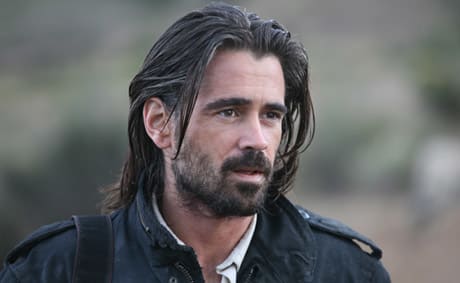With its crisscrossing, time-shifting narrative, Oscar-winning directorial pedigree and the dramatic weight loss of a leading man, Triage seems, on the surface, like more than it actually is, ultimately being far too familiar and slight in its implications to truly resonate.
It's a smart film, boasting impressive performances from both Colin Farrell and Christopher Lee, but is mildly patronizing and a little pretentious, which only detracts slightly from a message of relativity.
Starting in the middle of things with a wounded photojournalist awaiting medical attention, Triage details Mark Walsh's (Ferrell) unrelenting bloodlust and overall lack of concern for his personal wellbeing in relation to David (Jamie Sives), his best friend and fellow war photographer, whose desire to get home to his pregnant wife outweighs his desire to take pictures of dead people.
On the narrative front, David leaves Mark in the middle of the Kurdistan war zone, only to seemingly disappear, leaving Mark's girlfriend Elena (Paz Vega) trying to patch together the pieces in a piecemeal story. Enter Elena's father, Joaquin Morales (Christopher Lee), a therapist to Franco's fascists, who uses some no-nonsense techniques to help our injured protagonist face atrocities lived through on the battlefield.
Without experiencing things first hand, each character in the film spews opinions and conjecture about morality in relation to wartime decisions they disapprove of, only to have a contrary perspective thrown in their face. The notion is not only that of the internal struggle between ideal self-image and a differing reality when thrown in the thick of it but also one of the human inability to conceptualize that which we do not experience ourselves.
For example, the title refers to the act of sorting patients in priority for maximum survival, which is handled ironically when Dr. Talzani (Branko Djuric) shoots the badly wounded soldiers, tending only to those with readily treatable wounds. We pass judgment without understanding the grim realities leading to this.
And while it preaches complexities we cannot understand with a steady and assured hand, the film is ultimately too clichéd and self-righteous to earn the investment it so desperately wants.
(E1)It's a smart film, boasting impressive performances from both Colin Farrell and Christopher Lee, but is mildly patronizing and a little pretentious, which only detracts slightly from a message of relativity.
Starting in the middle of things with a wounded photojournalist awaiting medical attention, Triage details Mark Walsh's (Ferrell) unrelenting bloodlust and overall lack of concern for his personal wellbeing in relation to David (Jamie Sives), his best friend and fellow war photographer, whose desire to get home to his pregnant wife outweighs his desire to take pictures of dead people.
On the narrative front, David leaves Mark in the middle of the Kurdistan war zone, only to seemingly disappear, leaving Mark's girlfriend Elena (Paz Vega) trying to patch together the pieces in a piecemeal story. Enter Elena's father, Joaquin Morales (Christopher Lee), a therapist to Franco's fascists, who uses some no-nonsense techniques to help our injured protagonist face atrocities lived through on the battlefield.
Without experiencing things first hand, each character in the film spews opinions and conjecture about morality in relation to wartime decisions they disapprove of, only to have a contrary perspective thrown in their face. The notion is not only that of the internal struggle between ideal self-image and a differing reality when thrown in the thick of it but also one of the human inability to conceptualize that which we do not experience ourselves.
For example, the title refers to the act of sorting patients in priority for maximum survival, which is handled ironically when Dr. Talzani (Branko Djuric) shoots the badly wounded soldiers, tending only to those with readily treatable wounds. We pass judgment without understanding the grim realities leading to this.
And while it preaches complexities we cannot understand with a steady and assured hand, the film is ultimately too clichéd and self-righteous to earn the investment it so desperately wants.




